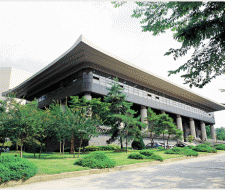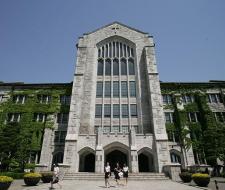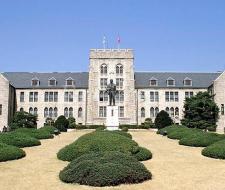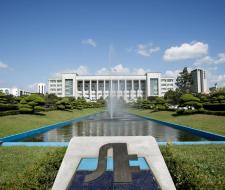Best universities in South Korea 2024
-
 Accreditations AACSB
Accreditations AACSB South KoreaDaejeonCurrently watching: 6from 13056.00 $ / yearApply with documents
South KoreaDaejeonCurrently watching: 6from 13056.00 $ / yearApply with documents -
 from 4384.00 $ / yearApply with documents
from 4384.00 $ / yearApply with documents -

 South KoreaDaejeonCurrently watching: 2from 7000.00 $ / yearApply with documents
South KoreaDaejeonCurrently watching: 2from 7000.00 $ / yearApply with documents -
 from 13143.00 $ / yearApply with documents
from 13143.00 $ / yearApply with documents -
 Apply with documents
Apply with documents -
 from 11000.00 $ / yearApply with documents
from 11000.00 $ / yearApply with documents -
 from 8391.00 $ / yearApply with documents
from 8391.00 $ / yearApply with documents -
 from 7000.00 $ / yearApply with documents
from 7000.00 $ / yearApply with documents -
 from 11536.00 $ / yearApply with documents
from 11536.00 $ / yearApply with documents -
 Apply with documents
Apply with documents
Alternative destinations
Education information
The universities in South Korea are becoming more popular among international students every year. Studying in this progressively developing country offers excellent prospects in terms of employment both in Korea itself and outside it. Another indisputable advantage of Korean universities is a loyal pricing policy in terms of education.
There are several advantages of studying in TOP universities in South Korea:
- Prestigious universities. South Korea is currently developing at a furious pace — a growing economy requires technical innovations, and financial markets require new professionals, so universities themselves are growing, getting richer and raising their level. At the moment, the Korean education system is almost as good as the countries of Europe, the UK and the USA, moreover, it is based on the model of the latter. According to the most authoritative rankings of QS and THE, several Korean universities are among the top hundred, and in the special QS Asia University Rankings, 8 Korean universities are in the top 50.
- International perspective. About a third of the programs at Korean universities are taught in English, and their share is increasing every year. Together with them, the number of foreign students and teachers is growing, which indicates the state's desire to bring Korean education to the world level.
- Affordable price. The cost of studying at Korean universities is the same for all students, regardless of citizenship. A year of study on the bachelor's degree program costs an average of 11,378 USD, a master's degree — 14,124 USD, a doctoral degree — 15,301 USD. Prices vary depending on the prestige of the university, the type of funding, but in any case they remain more affordable than similar programs in England or America. In addition, every year about 2 thousand students receive scholarships from the Korean government.
- Employment prospects. As mentioned above, South Korea is developing rapidly, and the pace of its development is second only to China. In this scenario, building a career or your own business in Korea is a very promising idea, especially in the field of IT and other technologies.
Top Universities in South Korea: Ranking, Funding, and Admission
South Korea's higher education landscape features a diverse range of top universities, each renowned for its academic excellence and specialized programs. Understanding the classification, admission requirements, and rankings of these institutions is crucial for prospective students.
Classification of Leading Universities in South Korea
South Korean universities are categorized based on their source of funding:
-
National Universities: Operated under the central government.
-
State or Public Universities: Established by regional governments.
-
Private Universities: Founded by private non-profit educational foundations.
Prestige in South Korea's higher education sector is less about funding and more about scientific potential and the quality of educational programs. Public and national universities mainly differ from private ones in terms of tuition fees. Private universities in South Korea, forming the bulk of the country's educational institutions, adhere to standards set by the Ministry of Education and possess state accreditation.

What firstly should be considered when choosing a university?
It depends on the student - everyone determines the most important criteria for himself. I would advise you to take several rankings and compare them with each other, plus take into account the cost of the course, the location of the university and its scale, the percentage of graduates' employment. See where graduates continue their studies or where they go to work.
Admission Requirements for International Students in Private Universities
-
Application Process: Universities select applicants independently, accepting documents via mail or online.
-
Enrollment Periods: Most universities offer two admission periods, with application deadlines typically in September-November and May-June.
-
Language Proficiency: Applicants must demonstrate proficiency in English (TOEFL 80 / IELTS 6.0) or Korean (TOPIK Level 3), with an expectation to improve Korean skills to Level 4 during the course.
-
Required Documents: Educational certificates with apostille, language certificates, motivation letters, recommendations, citizenship documents, portfolios (for creative fields), and additional achievements or publications.
Universities may also conduct entrance exams or interviews as part of the selection process. The Suneung exam, South Korea's national university entrance exam, is not mandatory for international students but can be advantageous, especially for admissions to the prestigious SKY universities.
Top Ranked Universities in South Korea
-
Seoul National University: The country’s largest university, offering a wide range of bachelor's, master's, and doctoral specializations. It is recognized for its diverse fields of study and extensive campus.
-
KAIST (Korean Advanced Institute of Science and Technology): Renowned for its scientific and technical education, focusing on research in engineering, materials science, and advanced technology.
-
Korea University: A multidisciplinary university noted for its practical approach to education, particularly in medical fields, with an extensive range of academic programs.
In summary, South Korea’s universities provide a broad spectrum of high-quality education opportunities. For international students, understanding the admission requirements and selecting a university that aligns with their academic goals is key to a successful educational experience in South Korea.
Top 15 best universities in Switzerland 2024
| 1 | Glion Institute of Higher Education Switzerland |
| 2 | Les Roches International School Montana |
| 3 | César Ritz Colleges Switzerland |
| 4 | IHTTI School of Hotel Management |
| 5 | Ecole Hoteliere de Lausanne |
| 6 | Geneva Business School |
| 7 | EU Business School Montreux |
| 8 | HIM Hotel Institute Montreux |
| 9 | Swiss Hotel Management School |
| 10 | Webster University Geneva |
| 11 | Business and Hotel Management School |
| 12 | Luzern IMI |
| 13 | Swiss Hotel Management School (SHMS) Caux |
| 14 | International University in Geneva |
| 15 | Culinary Arts Academy Switzerland |
Top 10 best universities in Netherlands 2024
Top 35 best universities and colleges in Canada 2024
| 1 | University of Toronto |
| 2 | McGill University |
| 3 | University of British Columbia |
| 4 | University of Alberta |
| 5 | Simon Fraser University |
| 6 | Montreal University |
| 7 | University of Windsor |
| 8 | York University |
| 9 | University of Guelph |
| 10 | McMaster University |
| 11 | University of Manitoba |
| 12 | University of Waterloo |
| 13 | Royal Roads University |
| 14 | Vancouver Film School |
| 15 | Kwantlen Polytechnic University |
| 16 | University of Calgary |
| 17 | Dalhousie University |
| 18 | Fanshawe College |
| 19 | University of Ottawa |
| 20 | Laval University |
| 21 | Sheridan College |
| 22 | University of Regina |
| 23 | Brock University |
| 24 | Thompson Rivers University |
| 25 | Humber College |
| 26 | Vancouver Island University |
| 27 | Mohawk College |
| 28 | Centennial College Toronto |
| 29 | Niagara College |
| 30 | Capilano University |
| 31 | Seneca College |
| 32 | Algoma University |
| 33 | Saint Clair College |
| 34 | Douglas College |
| 35 | LaSalle College |



